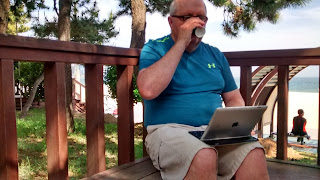When I was a
child, I used to listen to music and dance around the house. I pretended to be the
happy hero, rather than the little girl who’d lost her daddy. Daddy died of a
heart attack when I was seven, and I worried Mama might die, and I’d have to
live with my crazy aunt.
When I danced, I could be Ginger Roger or Fred Astaire. Today
I love to dance while watching Dancing
with the Stars, and see myself as a winner.
For many years, I thought I was the
only person who fantasized through dance. But then I met a hitchhiker named
Mary. (I have a character like Mary in my second novel, Hurricane House.)
I came to know Mary after I’d moved from Atlanta to Florida. When
I first met her I couldn't believe she was a hitchhiker. She looked like a fifty-year-old mother or grandmother.
Mary carried everything she owned in a duffle bag. Each item had
been neatly packed, not what you’d expect from a hitchhiker.
“Aren’t you afraid to
ride with strangers?” I asked her.
“I usually ride with truckers I trust,” she said, and went on
to explain how she showered and washed her clothes in truck stops. To earn
money, she cleaned the trucks she rode in, and when she felt lonely or sad, she
danced.
Mary used to be an opera singer in New York City, she said.
To prove it, she sang for me. She had a beautiful voice. When I asked her why
she would give that up, she said she had a tear on her vocal cords.
Back then, she had planned to get surgery to repair the
damage, but she lost her job as a switchboard operator. Technology had phased her
out.
Without a paying job, she eventually lost her apartment and
moved in with her boyfriend. Unfortunately, her boyfriend drank and abused her,
as her parents had when she was growing up.
To escape the abusive boyfriend, she took a train to Seattle,
thinking she could find a job there. She stayed in a homeless shelter while she
searched for work. The shelter smelled like “stinky socks,” she said, and being
a clean freak, she had to leave. That’s when she decided to hitch her first ride
with a trucker, and she’d been hitchhiking ever since, she said.
Not easy and often scary, she admitted. The hardest part was learning
to sleep sitting up and eating paper when she had no food.
She used to be an atheist, she said, but that all changed the
day her hunger forced her to pray, “God if you’re there, help me.”
After the prayer, she looked down, and saw twenty dollars on
the ground. From that day forward, she believed in God, she said.
A few weeks after I met and talked with Mary, she called me.
It was almost Thanksgiving. I asked Mary if she’d like to come visit me for a
few days. I didn’t expect her to clean and organize my house, but that’s what
she did. She even rearranged and color coordinated my closet. I have never been
that organized since.
I told everyone about Mary. I thought she could do the same
for them, and eventually she might make enough money to get off the road.
One of my friends said she’d pay Mary to clean and organize
her place. I thought Mary would be happy about this.
But when I told her, she frowned angrily. “I don’t want to
clean her place. She smokes. I helped you, because I wanted to, and now my job
is done.”
She asked me to drop her off at the MacDonald’s. “It’s time
for me to hit the road and dance away,” she said.
At first I felt sad leaving her there, but as soon as she
jumped out of the car, she smiled and waved and appeared happy.
A month or so later I received a card from Mary. On the card,
she’d painted a beach scene with a seagull flying in a blue sky—Mary would
probably say the seagull was dancing.
Since then, I’ve lost track of her. I wish we could have kept
in touch through the years. I’d like to know how she’s doing. She might be
happy to know Larry and I have gotten married. She thought he was a
stellar guy when she met him, and she was right.
She used to say she dreamed
of opening up a truck stop to serve the truckers, who had been kind enough to
let her ride with them. Serving others would allow her to dance, rather than
zombie through life, she said, and she preferred to dance.
Whenever I hear the song I
Hope You Dance, I’m reminded of
Mary. Written by Mark Sanders and Tia Sillers, this song seems to express the
inspiration she gave to me and offers guidance to us all. Here’s some of the
lyric:
“I hope you still feel small when you
stand beside the ocean,
Whenever one door closes, I hope one more
opens,
Promise me that you’ll give faith a
fighting chance,
And when you get the choice to sit it
out or dance,
Dance…I hope you dance.”
Here's my second novel Hurricane House, where I patterned one of my characters after Mary: A hurricane hits a Florida fishing village with a murderer at large:
My latest novel, A Message in the Roses, is based on a murder trial I covered in Atlanta. It's also a love story.
My first Mystery, Sex, Love & Murder: A young journalist, visiting New Orleans during Mardi Gras, is drawn into a series of murders involving the President.
Please visit my website for more information:
















.jpg)
.jpg)

